John McAfee, maverick who set up a lucrative cyber-security business and made and lost millions – obituary
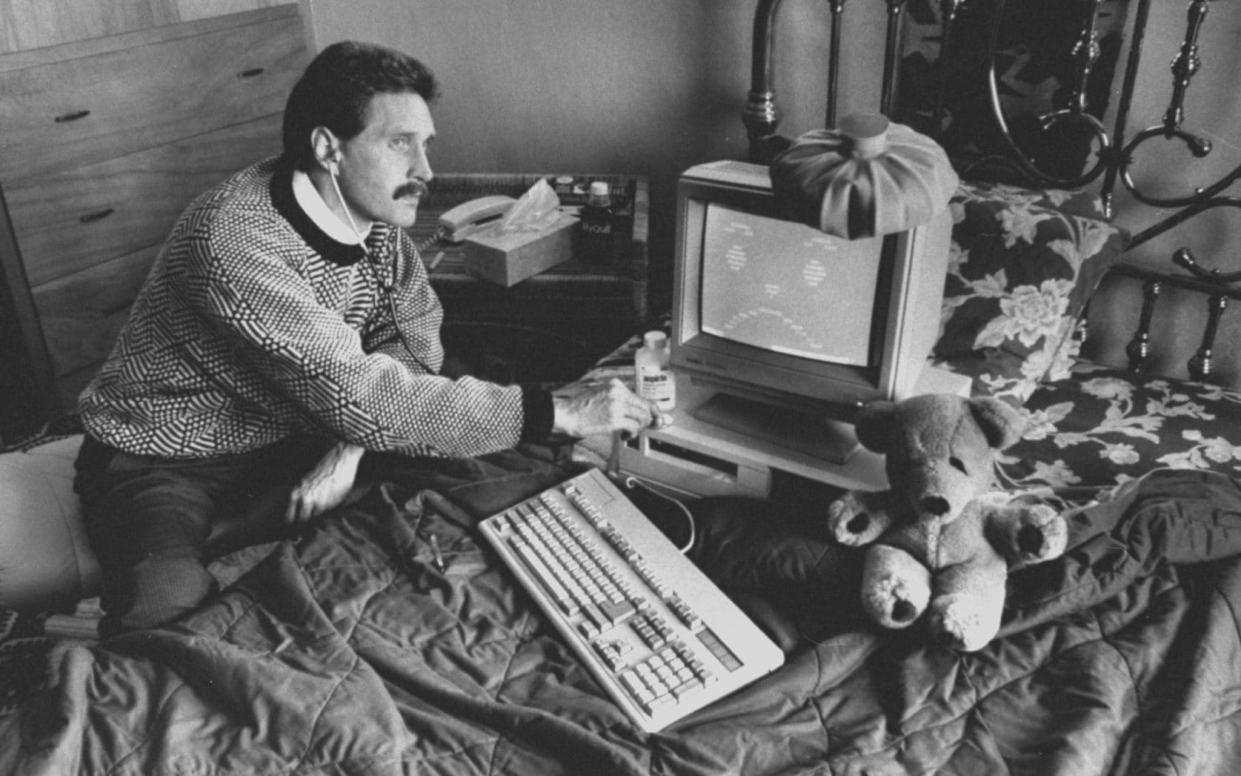
- Oops!Something went wrong.Please try again later.
John McAfee, who has died in a Barcelona prison aged 75, was a cybersecurity pioneer and creator of the eponymous anti-virus software which netted him a $100 million fortune; he subsequently became known for his colourful pronouncements and eccentric behaviour, which culminated in his fleeing Belize in 2013 disguised as a street hawker when wanted in connection with a murder.
McAfee became interested in computer viruses in the mid-1980s while working for Lockheed, the aerospace company, on a top-secret voice recognition project. It was at this time that Brain, a virus created out of curiosity by Pakistani programmers, began to infect thousands of computers across the world, having been distributed by floppy disk.
On working out how to eradicate the problem, McAfee shared the solution via the bulletin board, the forerunner of the world wide web. The clamour for it showed him that there was a market for such technology and, slightly before the likes of Peter Norton and Eugene Kaspersky, he set up an anti-virus business from home in Santa Clara, California.
“I knew the field would become extremely large,” he later told the BBC. “It’s why we have graffiti on the walls of the inner city. People like to deface things. They like to disrupt things.”
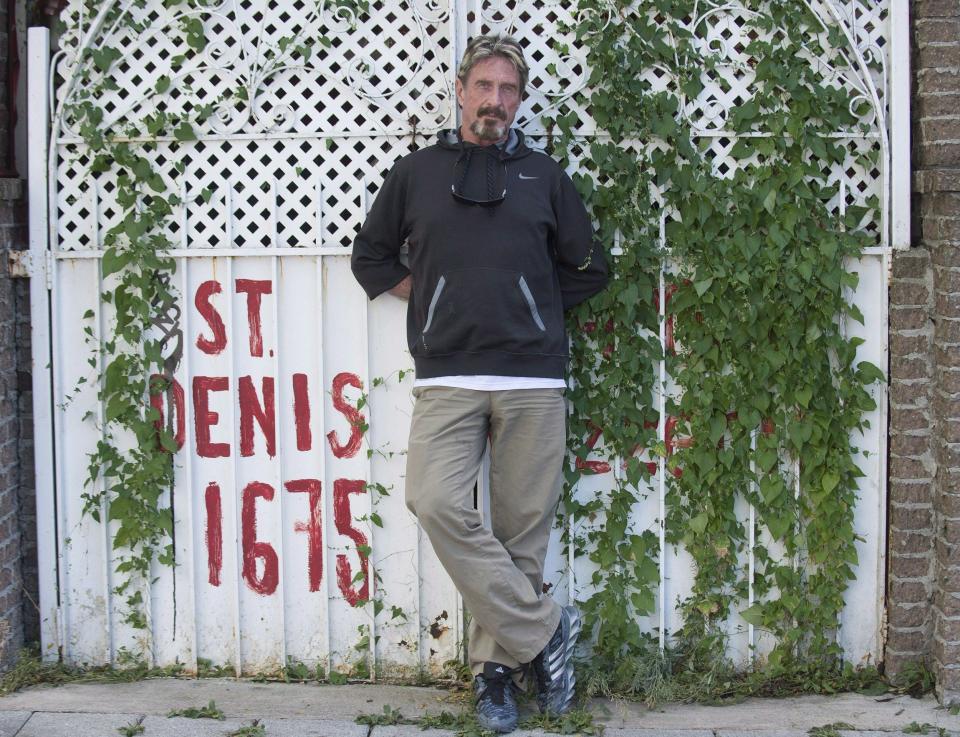
Within three years, he was turning over $5 million per year. McAfee admitted afterwards that the secret of his success lay in convincing firms that they needed his VirusScan software and to this extent he exaggerated the risks of viruses in what was still the infancy of the online age.
He appeared regularly on television predicting widespread disaster and one journalist would later call him a “master manipulator”. Others thought in retrospect that his programmes were a way of manifesting more widely his own paranoia, which had been enhanced by prolific drug use in his youth.
In 1992, the McAfee company was listed on the Nasdaq exchange for tech stocks and the founder’s shares valued at $80 million. Two years later, however, he sold these and severed his connection with the firm. It was eventually bought by Intel in 2010 for $7.6 billion. After several changes of name, it reverted to McAfee in 2017.
By then, McAfee had for years openly said that he no longer used the software as it was too much trouble. Although he had had investments in Zone Labs, and in an early instant messenger, Tribal Voice, he had largely drawn back from the industry, not least as he had become a scalp for hackers.
He took to buying computers through third parties, and to spending much time practising yoga. He had married for a second time and took out advertisements encouraging teenagers to avoid drugs.
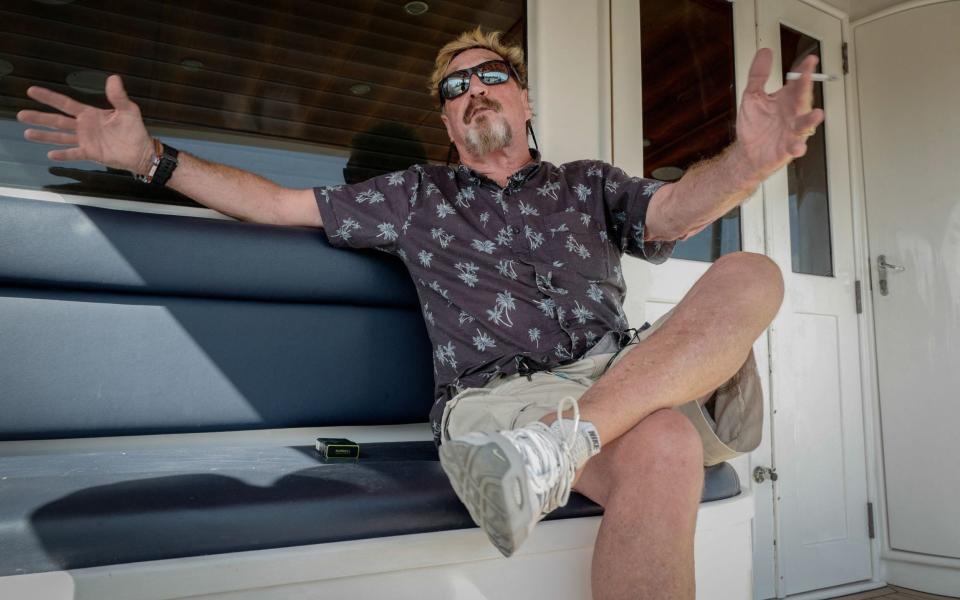
Then, in 2007, his wealth plummeted from an estimated $100 million to just $4 million when stocks and property values crashed with the onset of the recession. McAfee had invested much of his riches in building mansions for the super-rich which he could then not sell.
He reacted by moving to Belize, where newspaper profiles were soon depicting him as a latter-day Kurtz leading a Heart of Darkness-style existence. In a swamp near the ruins of a Mayan temple, he built his own encampment, patrolled by ex-convicts and filled with Tibetan art, a baby grand piano and a clutch of teenage girlfriends. His ostensible reason for basing himself there was to fund research into natural antibiotics.
McAfee, who at 65 sported a surfer’s goatee, dyed blond hair, tattoos and cargo shorts, began to inject himself with testosterone. Journalists sent to interview him discovered that his American girlfriend had left him after finding he had a new lover, a 16-year old prostitute named Amy. Their relationship had survived an attempt by Amy to shoot McAfee and make off with his money.
Events took a more serious turn in 2012. First, McAfee’s house was raided by police on suspicion that he was manufacturing methamphetamine. He denied this, claiming he was being harassed after not paying a $2 million bribe to a politician.
There followed a series of rows when he attempted to police himself a nearby village where he had settled Amy for safety but which he believed was a nest of cocaine smugglers. “Drug-addled” and “unhinged” were two epithets applied by others to him.
Then in December, McAfee’s former neighbour, Gregory Faull, was found shot dead. The two men had been on bad terms, in part over suspicion as to who had poisoned McAfee’s dogs. McAfee ultimately decided to flee the country, having stained his teeth and adopted various disguises, among them that of a drunk tourist.
However, his whereabouts in Guatemala was accidentally given away when the online magazine Vice published a photograph of him with the location data still attached. He was arrested but after faking two heart attacks managed successfully to fight extradition to Belize, being sent instead to America.
The Belize police subsequently said that he was not wanted for Faull’s murder, only for questioning. McAfee claimed that they had sent assassins after him. The country’s prime minister Dean Barrow characterised him as “extremely paranoid, even bonkers”. In 2017, plans were announced to make a film of McAfee’s life starring – inevitably – Johnny Depp.
John David McAfee was born on a US army base in the Forest of Dean, Gloucestershire, on September 18 1945. His father was an American serviceman, his mother English, and the base US territory, which later proved a crucial qualification when McAfee decided to run for president in 2016.
He grew up in Virginia, where he recalled a childhood leading a local gang of boys. “We got to escape from the real world,” he said, “and create one of our own.” His father, however, who worked as a road surveyor, was an alcoholic and would beat him and his mother, who had a job as a bank clerk. When John was 15, his father shot himself.
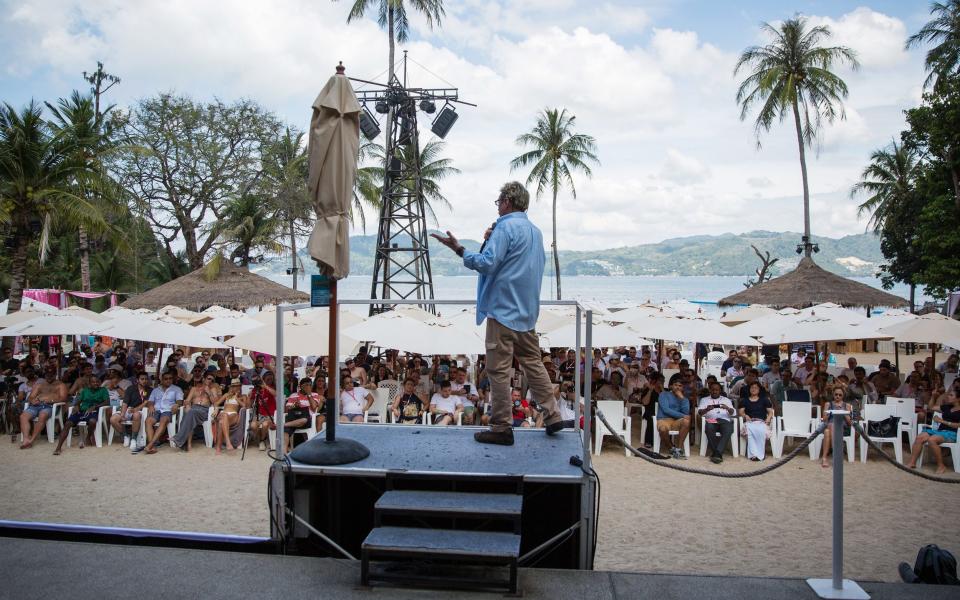
McAfee graduated from Roanoke College, having studied Mathematics, in 1967. He supported himself hawking magazine subscriptions and discovered that he was a natural salesman, albeit most of his earnings went on alcohol. He then began a PhD at Northeast Louisiana State University, but this came to an end when it was discovered that he was sleeping with a student he was supervising. The pair subsequently married.
He then had jobs with some of the largest technological enterprises of the day, including Nasa’s Institute for Space Studies and Xerox. Like many in the industry, however, he had become a heavy user of drugs. In 1969, he had concocted a fake CV to get a position with Missouri’s railway company, which used an IBM computer to co-ordinate train schedules.
McAfee had begun to experiment with hallucinogens, which were still exerting their effect when he went to work. He ended up, in his words, “stark, raving mad”, hiding behind a rubbish bin in an alley, and never returned to the office.
His marriage came to an end, but his addictions continued during later jobs in the information technology sector, where he claimed he and co-workers openly drank whisky and snorted the cocaine he sold.
He even took a year off to travel around Mexico peddling drugs. In 1983, however, he renounced his vices with the help of Alcoholics Anonymous and thereafter claimed to have remained sober.
After returning to the US in 2013, he settled in Tennessee with his third wife Janice, a former escort 40 years his junior. There he had set up a technology incubator. Anonymity online became his chief preoccupation.
In 2014 – four years before the revelations about the harvesting of data collected by Facebook – he warned against the use of apps on smartphones. These, he said, were used to spy on people. He then began to market an app which revealed which permissions had been granted by the user.
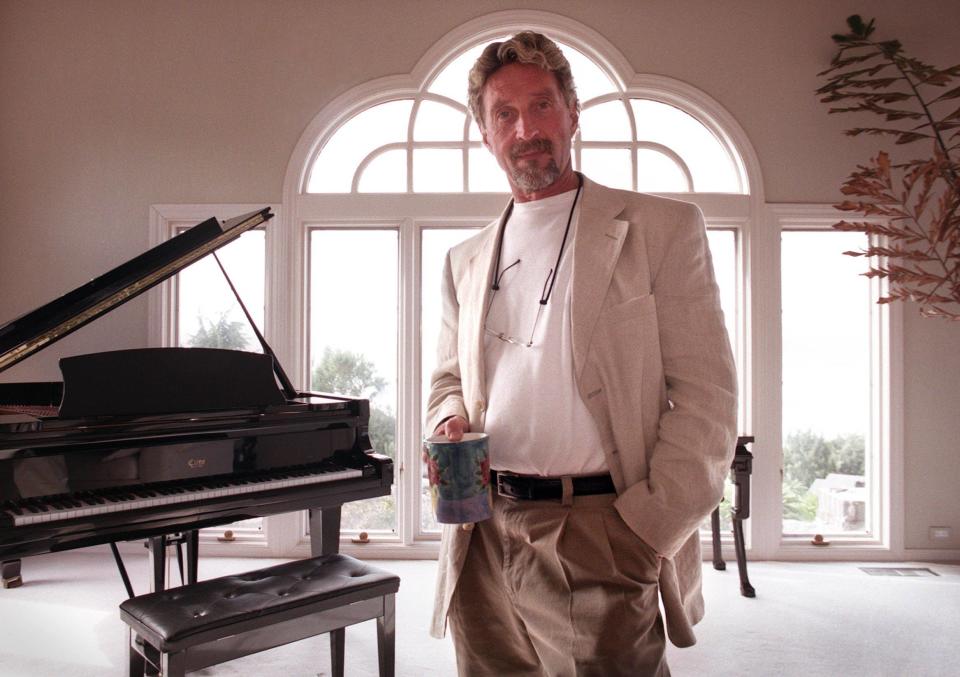
McAfee announced that for the 2016 election that he would seek the nomination of the Libertarian Party as their presidential candidate. His platform included the legalisation of marijuana, free market economics and more controls on online giants such as Google. In the event, the White House went to Donald Trump.
Latterly, McAfee had claimed to be able to decrypt messages sent via WhatsApp and to hack the iPhone. He had also promoted Bitcoin, predicting that by 2020 each would be worth $500,000. “If I’m wrong,” he promised, “I’ll eat my dick live on television.”
Last October John McAfee was arrested at Barcelona airport when he was about to board a flight to Istanbul, having been accused by US authorities of tax evasion. He was found dead in his prison cell on Wednesday, from apparent suicide, hours after Spain’s highest court had approved his extradition to the United States.
His wife survives him.
John McAfee, born September 18 1945, died June 23 2021

